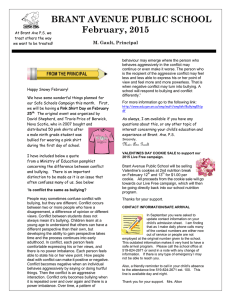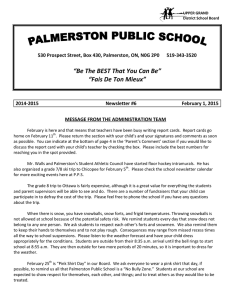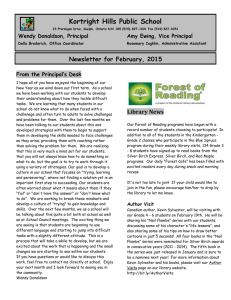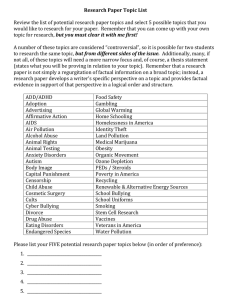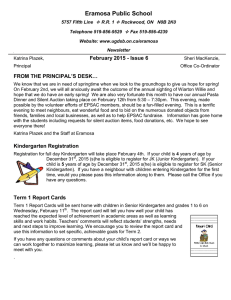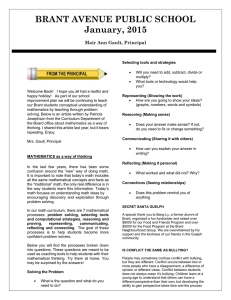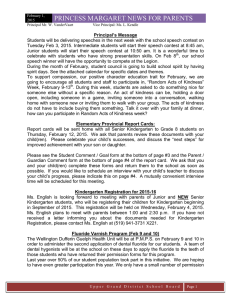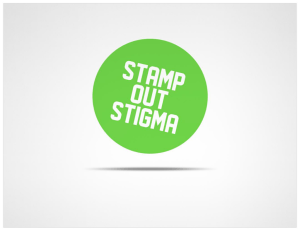BRANT AVENUE PUBLIC SCHOOL February, 2016 M. Gault, Principal
advertisement
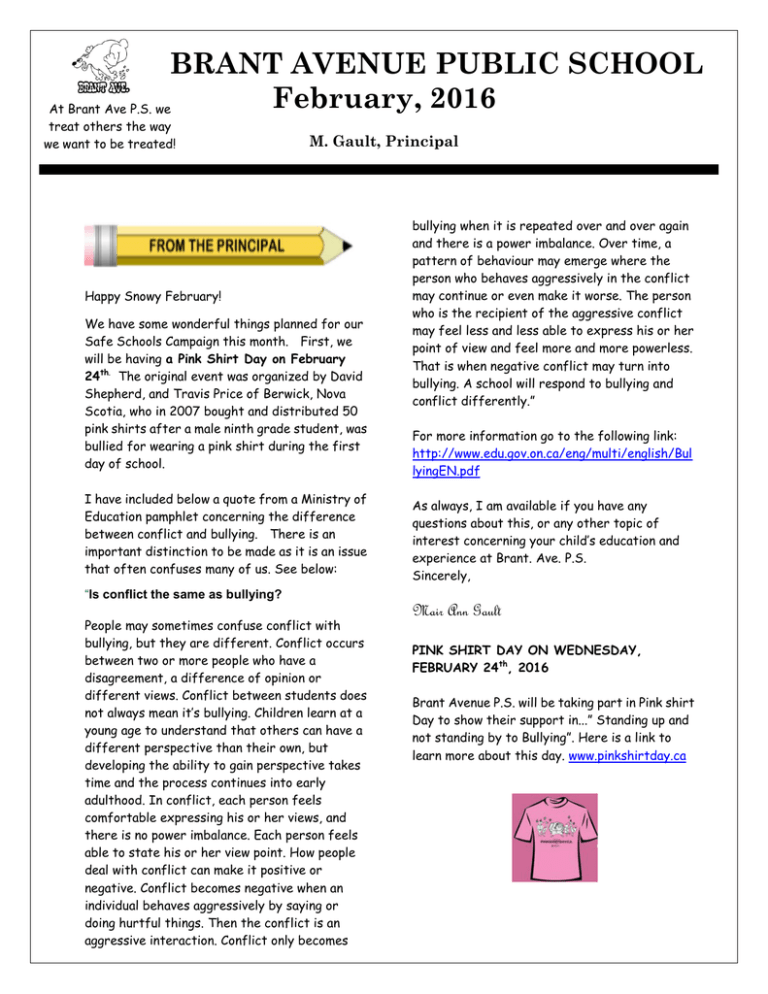
BRANT AVENUE PUBLIC SCHOOL February, 2016 At Brant Ave P.S. we treat others the way we want to be treated! M. Gault, Principal Happy Snowy February! We have some wonderful things planned for our Safe Schools Campaign this month. First, we will be having a Pink Shirt Day on February 24th. The original event was organized by David Shepherd, and Travis Price of Berwick, Nova Scotia, who in 2007 bought and distributed 50 pink shirts after a male ninth grade student, was bullied for wearing a pink shirt during the first day of school. I have included below a quote from a Ministry of Education pamphlet concerning the difference between conflict and bullying. There is an important distinction to be made as it is an issue that often confuses many of us. See below: “Is conflict the same as bullying? People may sometimes confuse conflict with bullying, but they are different. Conflict occurs between two or more people who have a disagreement, a difference of opinion or different views. Conflict between students does not always mean it’s bullying. Children learn at a young age to understand that others can have a different perspective than their own, but developing the ability to gain perspective takes time and the process continues into early adulthood. In conflict, each person feels comfortable expressing his or her views, and there is no power imbalance. Each person feels able to state his or her view point. How people deal with conflict can make it positive or negative. Conflict becomes negative when an individual behaves aggressively by saying or doing hurtful things. Then the conflict is an aggressive interaction. Conflict only becomes bullying when it is repeated over and over again and there is a power imbalance. Over time, a pattern of behaviour may emerge where the person who behaves aggressively in the conflict may continue or even make it worse. The person who is the recipient of the aggressive conflict may feel less and less able to express his or her point of view and feel more and more powerless. That is when negative conflict may turn into bullying. A school will respond to bullying and conflict differently.” For more information go to the following link: http://www.edu.gov.on.ca/eng/multi/english/Bul lyingEN.pdf As always, I am available if you have any questions about this, or any other topic of interest concerning your child’s education and experience at Brant. Ave. P.S. Sincerely, Mair Ann Gault PINK SHIRT DAY ON WEDNESDAY, FEBRUARY 24th, 2016 Brant Avenue P.S. will be taking part in Pink shirt Day to show their support in...” Standing up and not standing by to Bullying”. Here is a link to learn more about this day. www.pinkshirtday.ca We would like to make all parents and guardians aware of an additional PA Day that has been added to the school calendar. Following central collective agreements reached in the fall, an additional Professional Activity Day has been added to this school year. In the Upper Grand District School Board, this PA Day will be on April 25, 2016. VALENTINES DAY COOKIE SALE to support our 2016 Live Free campaign. Brant Avenue Public School will be selling Valentine’s cookies at 2nd nutrition break on February 10th and 11th for $1.00 per cookie. All proceeds from the cookie sale will go towards our Live Free campaign, which will then be going directly back into our school nutrition program. Thanks for your support. CONTACT INFORMATION/SAFE ARRIVAL In September you were asked to update contact information on your child’s admission sheet. I am finding that as I make daily phone calls many of the contact numbers are either now out of service or people are not employed at the original number given to the school. This outdated information makes it very hard to have a safe arrival program. Please call the school office at 519-824-2671 or send in a note with any change of information. If there is any type of emergency I may not be able to reach you. Also, a friendly reminder to call in your child’s absence to the attendance line 519-824-2671 ext. 100. This line is available day and night. Thank you for your support. Mrs. Alton Do you have a child that is allergic to paint? Please call the office to notify us as there will be some rooms in the school that will be painted. If so, we can have the job done at night instead of during the day while they are at school. LET IT SNOW, LET IT SNOW, LET IT SNOW! Winter is fully upon us and therefore this is a good time to send out a reminder about winter recess expectations. Please ensure your child comes to school with the appropriate winter clothing, including a coat, snowpants, hat, mitts and boots, etc. Extra socks and mittens are recommended. This is also the time we remind students about the “no one owns the snow, so share when building snow forts and snowmen”. Of all the rules, however, the most serious one is outlined below: No throwing snow, snowballs or ice balls. This rule is in place at all schools to maintain the safety of all students. We want to encourage safe and fun play this winter at Brant Avenue Public School. BUS/TAXI CANCELLATIONS During times of inclement weather, please listen to our local radio stations: 1460 AM CJOY; 106.1 Magic FM for school transportation cancellations. Information on bus/taxi cancellations and school closures are also posted on the Upper Grand District School Board’s website: www.ugdsb.on.ca If your child(ren) regularly travel by bus, parents do not need to inform the school of your child’s absence when buses are cancelled. If however, your child(ren) walk to school, you are asked to leave a message on the 24 hour attendance line (519-824-2671 ext. 100) for any absence or late arrival. Please note: on days when buses/taxis are cancelled, unless otherwise informed, the school will be open and a regular school program will be offered. Also, if parents of bus students drive their child(ren) in the morning, they must also be picked up at 3: 1 5 pm. PARKING Snow banks will begin to emerge along Brant Avenue which means a reduction in visibility and the need for an increased awareness of our students. Vehicles are to park along the road when picking up or dropping off students; this will ensure that no students walking home through the parking lot are at risk. Please adhere to these procedures as we work to make our school a safe place for students, staff and parents. INDOOR & OUTDOOR SHOES REQUIRED Please make sure your children have indoor shoes available at school for gym and in class. Boots are only to be worn outside. Not only is it unhealthy and dangerous for students to walk around the floors of the school in socks, students will not have a chance to change into their footwear if there is a fire alarm or drill. Thank you for helping with this. CONCUSSIONS OUTSIDE SCHOOL HOURS A concussion is a type of brain injury that changes the way the brain normally works. It can affect a student’s performance in both school work and physical activities. Rest is very important after a concussion because it helps the brain heal. While a child has a suspected or diagnosed concussion, full participation in school academic and physical activities can worsen symptoms and make for a longer recovery period. In the best interest of your child, parents and guardians are requested to contact the principal when a suspected or diagnosed concussion occurs outside of school hours (i.e. during outdoor play, sports, or a car accident). The principal will work with you to develop a plan for an individualized, gradual return to full participation in school activities. For more information, visit www.ugdsb.on.ca/concussions. SCHOOL COUNCIL MEETING DATE The next School Council Meeting date is set for Thursday, March 8th, at 6:30pm. A big thank you to our school council for fundraising $170 to be put towards each classroom for a hand on learning experience. There is also money being put towards our outdoor equipment such as balls etc for our students. TALKING TO YOUR CHILD ABOUT ART The gallery on your refrigerator: The refrigerator is the mini art gallery in many homes where student art is the featured exhibit. How wonderful for students to have their work honoured in their home and for them to be supported by their family! Also, we know that when the family is involved in a student’s learning, the student’s confidence, positive attitude and achievement grow. Show your child that you value their judgment as well as their art. Each week or so when the “exhibit” changes, let your child select the work to be displayed. Ask: “Which work are you most proud of - why?” or “Which work show your learning best - why?”. Research shows that when students assess and reflect on their own work their critical thinking skills develop. Before or after the art makes it to the fridge, reinforce creativity, risk-taking and the ability to communicate with some open questions ... think questions with no ”right” answer. Ask these questions or turn them into prompts for your comments about artwork: What can you tell me about your art? Tell me the story of your art. How did you make this? How would you describe your art to someone who hasn’t seen it? What I notice is (name what you see in their art). What I wonder is (ask a questions about it). What I like the most about your (name the type of art) is (name what you like in their art). How do you hope people will feel when they look at your art? If someone could walk into your art, where should they walk in? Would it be easy or hard for them to get in? Tell me more about that. What title would you give your art? Explain ... The gallery in your community: Taking your child to an art gallery to view and discuss art gives them a place to apply their thinking and learning. Using the same questions/prompts you use at home will help your child make connections between their work at school and the wider world. Walk through a room in the gallery, survey the art then return to discuss and spend more time at the work(s) that capture your interest. Try some gallery games to build critical thinking and discussion. In any room play: National Gallery: Choose (or make up) a country. Select 5 works that will hang in the welcome room at the airport where you enter the country. Explain what each piece of art reveals about the country. Ping Pong: Choose any piece of art and call it a Ping. Choose another and call it a Pong. Don’t explain why or how you made your choices. Then, thinking about your choices, your family classifies other pieces in the room as Ping or Pong. They explain how they made their decisions while guessing what your criteria was. Statue: Each person chooses a figure or object in a piece of art and creates a pose that represents it. The rest of the family tries to guess which piece of art. To view contemporary and historical art, visit the MacDonald Stewart Art Center in Guelph (free), the Dufferin County Museum and Archives in Orangeville and the Wellington County Museum and Archive between Fergus and Elora (free). (If you want references: Nethery, Carrie, “One Great Question”, Arts & Activities, San Diego CA, 2011 Ritchart, Ron et al, “Making Thinking Visible”, Jossey-Bass, San Franciscio CA, 2011 “Student Self-Assessment”, LNS Capacity Building Series, 2007 “The Ontario Arts Curriculum”, 2009) PREVENTING POLLUTION Pollution of our planet – air, water and land - is a big issue. It damages our environment, harms or kills plants and animals, and spoils our quality of life. The largest contributor to air pollution is human activity resulting from the burning of fuels such as used in industry and transportation using cars and trucks. Water pollution occurs when pollutants are discharged directly or indirectly into rivers and lakes without adequate treatment to remove harmful compounds. This is done on purpose by some unscrupulous industries or can happen by accident from toxic spills of chemicals or oil. Pollution of our land is often caused by littering or improper disposal of waste or by contamination of our soil by harmful chemicals. The Canadian Environmental Protection Act was put in place to monitor pollution and give guidelines for industries. We need to be aware of what causes pollution and its effects so that we can individually make a difference in protecting our planet. You as an individual can have a great impact on reducing pollution. Don’t litter, not even something as small as a gum wrapper. Where do you think it eventually goes? Even better, help pick up litter on your school yard and participate in annual cleanups in your local parks and rivers. Don’t use disposable plastic products like bags or water bottles. Bring a cloth bag and use reusable water bottles. Tell your family to use “green” cleaning products like baking soda and vinegar instead of chemical cleaners. Take all batteries, leftover paints, and motor oil to the hazardous waste depot instead of putting them in the garbage. Take unused prescriptions back to the pharmacy for proper disposal. Encourage friends and family to help with the anti-pollution cause! As individuals we can put our voices together and make ourselves heard in our effort to stop pollution on planet Earth. Green revolution is the best solution to stop pollution. - Let’s go green, everyone! LET’S TALK ABOUT MENTAL HEALTH Bell Let’s Talk is a nationwide campaign to increase awareness and decrease stigma around mental illness. I am sure that you heard the ads and hopefully participated in Let’s Talk Day on Jan 28. What a great way to get the conversation going on mental illness! However, mental illness does not just occur in January and the discussion should not end there either. Here are some tips and ideas to keep the conversation going so that each one of us can do our part to increase awareness, decrease stigma and improve the lives of children, youth and adults with mental illness. Bell Let’s Talk’s 5 Ways to Help (from http://letstalk.bell.ca/en/end-the-stigma /) 1. Language Matters Words matter…but they can also hurt. Pay attention to the words you use. Explain to friends and colleagues who use words like “psycho” or “nut” without thinking that their comments may be hurtful and provide an alternate view. http://psychcentral.com/blog/archives/ 2013/04/29/9-things-not-to-say-to-so meone-with-mental-illness/ 2 out of 3 people with mental illness suffer in silence, fearing judgement and rejection. Canadian Medical Association 2. Educate yourself. Myths exist about mental illness that contribute to stigma. Learn the facts. Learn more, know more. Be knowledgeable and help fight the stigma with facts. http://www.cmha.ca/mental-health/und erstanding-mental-illness/ On any given week, more than 500,000 Canadians will not go to work because of mental illness. Mental Health Commission of Canada 3. Be Kind Small acts of kindness speak volumes. Don’t stand by if someone is being labeled or bullied. Treat a person who has a mental illness with the kindness and care you give to people with other illnesses through a friendly smile, a helping hand, a phone call or a visit. http://mindyourmind.ca/wellness/rando m-acts-kindness Only 49% of Canadians said they would socialize with a friend who has a serious mental illness. Canadian Medical Association 4. Listen and Ask Sometimes it is just best to listen. Don’t trivialize someone’s illness. Instead, say: “I’m sorry to hear that, it much be a difficult time. Is there anything I can do to help?” http://www.time-to-change.org.uk/talk-about-m ental-health/tips Once depression is recognized, help can make a difference for 80% of people who are affected, allowing them to get back to their regular activities. Canadian Mental Health Association 5. Talk About It Start a dialogue, not a debate. Break the silence. Talk about how mental health touches us all in some way directly or through a friend, family member or colleague. Stories of lived experience are the best way to eradicate stigma. Support mental health and anti-stigma programs in your community. http://letstalk.bell.ca/en/toolkit/ 1 in 5 Canadians will experience a form of mental illness at some point in their life. Canadian Institute of Health Research For more information go to our board website: www.ugdsb.on.ca/parents click on the Mental Health tab. For all our mental health, let’s keep talking and listening and caring and connecting. Dr. Lynn Woodford is the Mental Health and Addiction Lead for Upper Grand District School Board Follow me on twitter: @drlynnwoodford SELF REGULATION Does your child struggle to calm his/her body and mind in order to cope with challenges or solve problems? The ability to be calmly focused and alert can be difficult for many children, as well as adults. The ability to self-regulate may change in different situations and stages of life. As parents, you can help your child use strategies to calm his/her body and mind by modelling what works for you. For example, when frustrated about being caught in traffic, you may use self-talk and listening to music to help calm the situation. You may say, “This traffic is terrible and I am feeling very frustrated. I know that I can’t do anything about the traffic so I am just going to tell myself to relax, this will pass, I can turn on some of my favourite tunes!” Strategies that may work for your child as calming or focusing strategies include: exercise (e.g. a short run), reading a book, listening to music, talking to someone, self-talk, counting to 20, getting a drink, taking a break, or deep breathing. Generally speaking, calming the body and mind is necessary before challenges or conflict can be successfully handled. Resources for Parents Book: Zones of Regulation by Leah M. Kuypers Zones of Regulation http://andersoncarla.blogspot.ca/2014/08/zone s-of-regulation.html Relaxation Techniques http://visuals.autism.net/main.php? g2_itemId=138 Today’s Parent: Easy Ways to Teach Your Child to Self-Regulate http://www.todaysparent.com/ki ds/preschool/easy-ways-to-teach-your-child-to -self-regulate/ Responsive Classroom: Teaching Self-Calming Skills https://www.responsiveclassroom.org/blo g/teaching-self-calming-skills Video: A story: Staying Calm When Angry https://www.youtube.com/watch?v=DnmF fxWjsvshttp://andersoncarla.blogspot.ca/2013 /12/self-regulation.html KEEPING CHILDREN AND YOUTH SAFE ONLINE Over the last few years, there has been a significant increase in the number of reported cases of young people involved in self/peer exploitation. This is generally defined as youth creating, sending or sharing sexual images and/or videos with peers via the Internet and/or electronic devise. The Board recently purchased a resource for every elementary and secondary school called Self/Peer Exploitation, School and Family Approaches to Intervention and Prevention. The resource was created by the Canadian Centre for Child Protection, which is a non-profit charitable organization dedicated to promoting safety of all children. Principals and Vice Principals also received an in-service on the guide. The following two links may assist youth and families who have been impacted by child sexual exploitation: Cybertip.ca may be used to report child sexual exploitation NeedHelpNow.ca is a website that offers find some practical information for youth on how to deal with this (for example, how to get pictures removed from the internet, how to deal with peers, how to talk with someone, etc.). February 10, 2015 is International Safer Internet Day. Please consider using this day to talk to your child(ren) about internet safety. The Canadian Centre for Child Protection also produces several useful resources for parents that may be found using the following links: https://www.cybertip.ca/pdfs/C3P_SafetyShe et_SelfPeerExploitation_en.pdf https://www.cybertip.ca/pdfs/C3P_SafetyShe et_Cyberbullying_en.pdf Public input sought for draft policies The Upper Grand District School Board has adopted a new approach to the development of policies and procedures, important documents that guide the board, staff and activities of our school system. Our goal is to improve policies and procedures at the draft stage, with your help. By providing an opportunity for input from parents, the community and stakeholders we are aiming for greater openness and transparency in our governance. The first policy, procedures and guidelines to be posted for public consultation are related to “Equity and Inclusive Education”. You are invited to review the draft documents and submit online feedback at www.ugdsb.on.ca/policy. The deadline for public input is April 13, 2016. Persons without internet access may call 519-822-4420 ext. 723 to request a printed copy of the draft documents.
